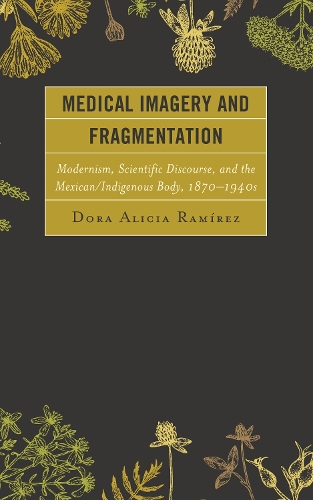
Medical Imagery and Fragmentation: Modernism, Scientific Discourse, and the Mexican/Indigenous Body, 18701940s
(Hardback)
Publishing Details
Medical Imagery and Fragmentation: Modernism, Scientific Discourse, and the Mexican/Indigenous Body, 18701940s
By (Author) Dora Alicia Ramrez
Bloomsbury Publishing PLC
Lexington Books
19th July 2017
United States
Classifications
Tertiary Education
Non Fiction
810.9868720082
Physical Properties
Hardback
112
Width 160mm, Height 237mm, Spine 15mm
358g
Description
This Book marks a time period (1870s-1940s) when Mexican authors writing in English saw themselves as transnational authors whose role was to teach the English speaking public about Mexico. This book takes a look at four inspiring women whose ideas represent the way medicine and science permeated the personal lives of Mexican and Indigenous peoples whose lifestyles did not happen to meet the requirements of an industrialized or modern citizenry. These women include historical figures such as the folkloric healer, Teresa Urrea (1873-1906), and authors, Maria Amparo Ruiz de Burton (1872), Maria Cristina Mena (1914), and Josefina Niggli (1947). These women writers focused on the modernist construction of the body and brought in aspects of how the soul (through racial, gendered, national, political, and socio-economic lenses) was reconstructed as a way to manage the health and space of theMexican/Indigenous populations in order to move into an era of industrialism and positivism. By focusing on how industrialism led to the negation of racialized bodies, knowledges, and spaces, this book takes a deeper look at the concept of the individual as a medical, economic, political, and theoretical term, focusing on the way medical knowledge, the doctor, surgery, experimentation, healing, and specifically, the soul, is treated in Latina modernist literature. This book adds to the modernist discussions of literary figures such as Bernard Shaw, T.S. Eliot, D.H. Lawrence, William Carlos Williams, Frida Kahlo, Ezra Pound, and Gertrude Stein. Urrea, Ruiz de Burton, Mena, and Niggli continue the critique of a burgeoning medical system and rhetoric, and they add the Mexican/Indigenous viewpoint and transnational perspective that is important to any dialogue.
Reviews
Dora Ramirez examines the writings of Amparo Ruiz de Burton, Teresa Urrea, Maria Cristina Mena, and Josefina Niggli through the critical lens of contemporary medical environmental theories of the body and of the soul. She explodes the modernist concerns with the body and the soul by deploying an eclectic medical humanities and Chicana feminist analysis to highlight the contributions of these stars in the Chicanx literary heavens. Undoubtedly students and scholars of American literature and specifically Native American, Chicanx or Latinx literatures will find a treasure trove of observations and insights in Medical Imagery and Fragmentation: Modernism, Scientific Discourse, and the Mexican, Indigenous Body, 1870-1940s -- Norma Cantu, Trinity University
Author Bio
Dora Alicia Ramrez is associate professor in the English department at Boise State University.
